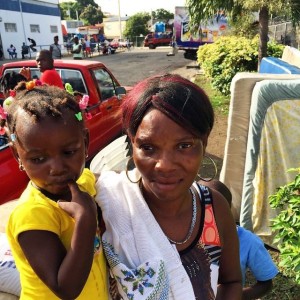This post is also available in: Kreyol
This post was originally written in: Kreyòl
“I will never return to the Dominican Republic, not even for gold and diamonds.” Sonia Pierre, 37, with two now stateless children: Kervens Masela 4 yearrs old and Choucheline Masela 2 years old. Sonia arrived at the border of Haiti and The Dominican Republic in Wanament with tears in her eyes, but relieved because she says she escaped after receiving threats from her neighbors in Santiago where she had been living for 9 years. Sonia escaped with 2500 pesos, her bed, two chairs and her children’s clothes. Those are the only things she could carry with her when she left Santiago. Her husband is dead, killed in Santiago. Thugs killed her husband and chopped up his body after a dispute while he was selling in the Dominican Republic.
Sonia’s two children are Dominicans, but after her house was burned down two years ago by criminals, she has no legal papers to show for herself or for the children. Without a husband and with two kids Sonia’s life became hell in a country she went to in search of a better life. Sonia used to sell fruits and vegetables in the Dominican Republic, but she lost her business after she lost all of her possessions and savings in the fire.
 “After the deadline for the registration program expired, I devoted my time to finding a way to return to Haiti to save my life and my children’s lives. It has been more than 10 days since Dominicans have been threatening me and my neighbors to leave the area.”
“After the deadline for the registration program expired, I devoted my time to finding a way to return to Haiti to save my life and my children’s lives. It has been more than 10 days since Dominicans have been threatening me and my neighbors to leave the area.”
Sonia was not able to register in the legalization process because she lost her and her children’s papers in the fire. Sonia’s children, who were born in the Dominican Republic, are now without papers and without a nationality. They were only able to cross the border because of the lack of supervision and government presence to reinforce immigration services in this moment of crisis. Yet last week, the Haitian president declared that Haiti will not be receiving any Dominican citizens.
At the border in Wanament, and along all the other borders between Haiti and the Dominican Republic, there is one thing occuring: Haitians abandoning the Dominican Republic to return to Haiti. Most of the day, the border is taken over by people leaving in large numbers. All types of people: victims of Dominican bandits, police or military. Some of those who have come back to Haiti are illegal, a small group is legal but have returned because they disagree with how their compatriots are being treated by Dominican authorities and criminals who have taken advantage of this difficult time to steal from people.
I don’t have much, but I have my dignity.
While we walked, Sonia told me “I don’t have much, but I have my dignity. I went in search of a better life with my husband, but I‘ve lost him. I am only one victim of violent acts by Dominican criminals and the state. Many other Haitians I know who have also been victims, and they are in a very serious situation. Some of them want to leave but do not have the means to leave everything they own, and there are others that are in hiding.” I listened to Sonia attentively, It was clear that her words were the words of a traumatised and desperate person.
It was very difficult to speak to Sonia because she was in a rush to get as far away from the DR as possible. I had to choose between proceeding with asking Sonia more questions to write a perfect story, or help her carry her things and her children to a bus that could get her on her way. I chose to help Sonia get her things from the Dominican station to a bus that was headed to Gonayiv.
Many have been watching as Haitians return to Haiti en masse over the last 11 days, but there is much we still do not know, and we do not know what these people are leaving behind. Sonia is not the only victim. Andre Joseph 53 years old, spent 40 years in the Dominican Republic. Andre is one of 25 people who were deported at the Malpasse border. On June 17th, the deadline for registration for the legalization program, a group of people attacked Andre’s house in Barahona and threatened to burn his house down with his wife and children still inside.
Andre rushed and turned himself into the nearest police station. There, Andre was arrested, and detained at a detention center in Jimani where he spent more than 7 hours before they dropped him off at the border late at night. His vegetables, animals and everything he owned were stolen. Today, Andre sleeps on the floor in a classroom in Fonbaya, Haiti where a group of Jesuit priests and one pastor in the area are temporarily sheltering people while school is out.
In Andre’s case, he encountered some difficulty in his process to register. Andre was living with only Haitian papers, so he paid a Dominican neighbor to help him obtain Dominican papers. But the papers his friend got him turned out to be fake. Upon realizing this, Andre tried to obtain legal papers, but the registration office was far and Andre was limited by a foot injury in the months before his deportation.
The reasons for the mass return of Haitians after the threat of deportations by the Dominican authorities are many. Among the first group of people to hurry back to Haiti are those who have been victimized by authorities and criminals in the DR. Sonia and Andre’s stories are not uncommon in the Haitian community in the Dominican Republic. Currently, the mass return of the most vulnerable Haitians is not happening only because of legal issues, this exodus is the result of the constant persecution many Haitians experience every day in the Dominican Republic.
Sonia and Andre’s stories unmask the incomplete narrative of “voluntary deportations.” Can we truly call it “voluntary” when people are leaving in the wake of threats? Can we truly call this “voluntary” when people have no other place to go? Sonia says that gold and diamonds could not convince her to ever return to the Dominican Republic. Now the question is, will the conditions awaiting her and her children in Haiti permit her to keep this promise?

Bon bagay!